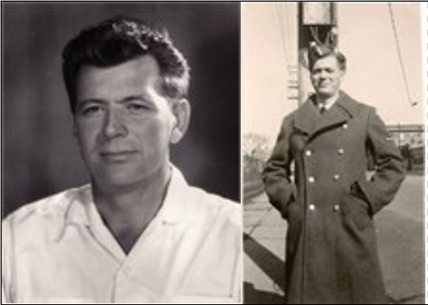
Image Credit: Contributed by author
March 15, 2016 - 6:22 AM
"For everything there is a season, and a time for every matter under heaven..." ~ Ecclesiastes 3:8
A time for peace...
If World Wars One and Two have been described as two bookends of a Long War in which the dream of Wilsonian internationalism succumbed to isolationism and ultimately to the wrenching spasm of a second global war, John Lewis Gaddis has described the next half century as the "Long Peace." Not because there was widespread harmony or even an absence of war in the world, but because between the end of the second world war and the collapse of the Soviet Union in 1989 there was no systemic war between the great powers.
Mel and Clarence Hewitt were products of the Long War, and my father Glenn Anderson was a man of the Long Peace. Having joined the Royal Canadian Air Force at 19 in 1944 and graduated as a navigator on a Mitchell bomber, he was on his way overseas on a troop transport when the war ended. The one great failure that I think coloured his subsequent life was failing pilot school due to vertigo. Not only did he vow to never fail again, but in later years made sure I had no fear of heights by holding my 5-year-old body out over a 13-foot-drop to nip in the bud any fear of heights I might develop. Something must have gone wrong with the plan since I still have nightmares of falling and I'm terrified on the second step of a stepladder, but I never did tell him about that second failure.

Lt. Robert Glenn Anderson circa 1945 (left)/Dr. Robert Glenn Anderson circa 1967
Image Credit: Submitted by author
In the immediate aftermath of war, with the United States the unquestioned hegemon of the western world, a new spirit of internationalism swept from Washington across the free world. Truman and Eisenhower first reconstructed and then threw a defensive nuclear umbrella over western Europe, in return demanding an expanding free trade regime and the dismantling of the European overseas empires, the latter demand made starkly plain by the Suez Crisis of 1956.
Canada embraced the new internationalism across all its dimensions. As a so-called "middle power" we leveraged our weight by encouraging multilateral institutions, including the newly formed United Nations and the North Atlantic Treaty Organization (NATO). Because we were not powerful enough to do anything substantive unilaterally but were capable of adding to the power of others in maintaining systemic order, not only did we contribute troops to strategic stabilization efforts, but threw our weight into economic stabilization efforts as well, including foreign development, foreign aid, and generally fostering what is now known as globalization.
They were heady times for a young man whose formative years were spent on a small farm in a forgotten corner of Ontario during the Great Depression, surrounded by dreams no bigger than the one room shack n' loft he and seven siblings were born in. I went back to see it some 40 years later and found a yellowed, water stained copy of "Composition and Grammar For Ontario Public Schools, 1939 edition" tucked away in a heap of mouldering detritus from those years in a corner, quite probably his youngest sister Shirley's. I thought it was a cow shed when I first saw the house he grew up in.
My dad used his GI benefits to go to university and graduated nine years later with a PhD in plant genetics. He worked for the Canadian government at the Government Research Station at the University of Manitoba, had a passel of kids and then, in keeping with the times, joined the Rockefeller Foundation and packed his family off to India to feed the world in the Green Revolution of the 1960s under Norman Borlaug.
We Canadians like to look back romantically on the Long Peace as if we selflessly gave of ourselves in those days. Economic aid, social development, peacekeeping, our reputation as good guys... all that has taken on a golden nostalgia bordering on mythology. But the truth of the matter is that we did it almost entirely out of national self-interest. As the Soviets and Americans evolved from allies to problematic foreigners to existential opponents, we in the west became locked into the conflict. The price of the peace in the first world, at the center of the system, was a violent struggle for hearts and minds in the post-colonial world, at the periphery of the system.
We call the Long Peace the Cold War, but in truth for Korea, Vietnam, Rhodesia, Angola, El Salvador, India, China, Pakistan, Tibet, Afghanistan and many, many more it was hot war stoked by both superpowers as they jockeyed for position around the edges of their European stalemate. The Long Peace was in truth a stand-off in every dimension, from nuclear to geostrategic to economic to social, and the resulting proxy wars and civil wars and revolutions required cooling off lest they become friction points between the powers and flare out of control. Whatever the motivation of the individuals of the era, the governments of the time did it out of self-interest and we today pretend it was out of altruism. That's what peacekeeping was all about.
My dad spent his career doing what he could to bring India out of starvation, and when he left in 1971 India had gone from a net importer to a net exporter of cereal grains, mainly due to increased wheat and rice yield. His life's work was in step with the age, and although I know he did it from a desire to do good, his work, like peacekeeping, was a small cog in a large response to specific economic conditions and strategic aims between 1945 and 1989. He died, suddenly, in 1981, at the same age as I am as of this writing. He was a good man, and a product of his era.
To be continued...
— Scott Anderson is a Vernon City Councillor, freelance writer, and a bunch of other stuff. His academic background is in International Relations, Strategic Studies, Philosophy, and poking progressives with rhetorical sticks until they explode.
News from © iNFOnews, 2016